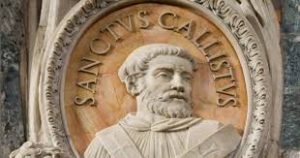HOMILY WEEK 28 03 – Year II
Claiming our Inheritance and Called to Conversion –
Optional Memorial of St. Callistus I
((Gal 5:18-22; Ps 1; Luke 11:42-46
******************************************************
Have you heard the expression “The spiritual life is more a journey than a destination?” There is some truth to that statement.
Today’s readings call us to conversion, and to claim our inheritance of the kingdom of God. They invite us to let go of the works of the flesh, to live by the Spirit, be guided by the Spirit, and to pray for the gifts of the Holy Spirit.
Does Paul’s list of the works of the flesh sound all too familiar? In your spiritual life, have you ever felt sort of hopeless in a struggle with some particular sinful habit or character defect? Like there has been no progress?
While that may be our reality from our perspective, that is not how God sees us. We belong to him. Our sinful passions were crucified in Baptism, and we are now filled with his Spirit.
So why do we still falter? Because conversion and the call to holiness is a process, and our sins don’t disappear overnight. In a sense, the spiritual life is more a journey than a destination. God sees the bigger picture, knows our weakness, and never forgets the Spirit he has placed within us or the natural goodness that we have. A beautiful encouraging thought coming from Sr. Teresita Kambeitz is: “God accepts us as we are, and believes in whom we can become.” And never forget – God does not make junk. Every time we say “no” to some temptation, or reach out to others beyond ourselves, we make some progress, and that makes God smile.
Ron Rolheiser OMI speaks of conversion in two senses. The first is based on the word metanoia. Meta means higher, and nous has to do with mind. Conversion, then, involves putting on our higher, trusting mind. The opposite is paranoia, a divided, fearful and distrustful mind. The symbol of metanoia is open hands, totally trusting and open like Jesus on the cross. The symbol of paranoia is a clenched fist, defensive, closed and ready to strike back.
On a second level, Rolheiser reminds us that conversion is a life-long process. We don’t convert and then become disciples. On the contrary, we become disciples, and then enter into a life-long process of conversion, of growth towards holiness, and transformation into the likeness of Christ.
In the 12 Step program, members often hear the words “we seek progress, not perfection.” That is what the readings are about today. Jesus in the Gospel points out to the Pharisees where they have gone astray, putting external observances of the law before the law of love, and invites them to conversion. And St. Paul also invites us to conversion, to let go of the works of the flesh, to live in the Spirit that produces spiritual gifts within us, and to be guided by that Spirit. It is good to remember that good spirituality is all about letting go, or as St. Paul puts it, “crucifying the flesh with its passions and desires.”
The process of conversion involves self-awareness, an admission that we may suffer from the spiritual blindess of the Pharisees, which often leads us to project our shadow and defects we fail to see in ourselves, onto others (the teaching of Jesus about seeing the splinter in the eyes of others rather than the log in our own). The lawyers in the gospel were not aware they were lacking in compassion and genuine caring about the burdens others were carrying, some of those burdens the result of the lawyers own doing. All of them had neglected the priorities of God, which are fairness, justice and the reality that God is lavish love, not just a giver of laws.
 Today the church invites us to honour St. Callistus I. Most of what we know about Callistus, an early pope, was written by a hostile opponent, St. Hippolytus, and must be carefully interpreted. From his early years, Callistus was the slave of a Christian. Honest and intelligent, he was put in charge of a bank that eventually failed. For this and other incidents, he was arrested and sentenced to labour in Sardinian mines. About 199, Pope Zephyrinus made the enfranchised Callistus (freed earlier by his original master) his deacon and counsellor and put him in charge of the first official Christian cemetery in Rome, known today as San Callisto cemetery. In 217, Callistus was elected pope and, despite strong opposition, introduced humanitarian reforms. He met a violent death about 222, probably during an uprising against Christians, and was buried on the Via Aurelia.
Today the church invites us to honour St. Callistus I. Most of what we know about Callistus, an early pope, was written by a hostile opponent, St. Hippolytus, and must be carefully interpreted. From his early years, Callistus was the slave of a Christian. Honest and intelligent, he was put in charge of a bank that eventually failed. For this and other incidents, he was arrested and sentenced to labour in Sardinian mines. About 199, Pope Zephyrinus made the enfranchised Callistus (freed earlier by his original master) his deacon and counsellor and put him in charge of the first official Christian cemetery in Rome, known today as San Callisto cemetery. In 217, Callistus was elected pope and, despite strong opposition, introduced humanitarian reforms. He met a violent death about 222, probably during an uprising against Christians, and was buried on the Via Aurelia.
The Eucharist is a sharing in the work of the Spirit who transforms humble gifts of bread and wine into the Body and Blood of Jesus the Christ. May our participation in this celebration grant us forgiveness, heal us of our shortcomings, and take us a little further along the path of conversion, of metanoia, so that we can serve our Lord more fully and joyfully.



